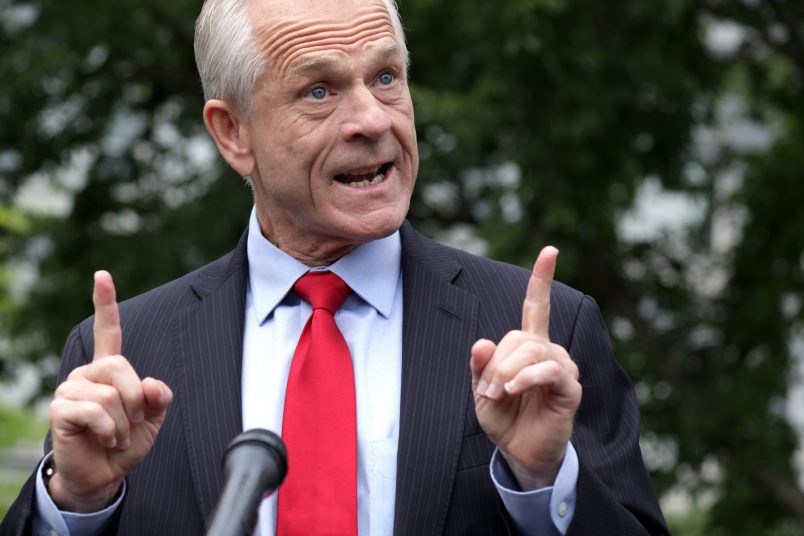The President’s top trade adviser circulated a report Thursday detailing all the ways that, in fact, the 2020 election was stolen on Joe Biden’s behalf.
Peter Navarro, who infamously invented and quoted the fake expert “Ron Vara” in several of his books, provided a similarly colorful analysis of the supposed “irregularities” he said plagued the 2020 race — starting “at the stroke of midnight” on Election Day.
He also repeated obvious mistakes that have been pointed out by judges and national media outlets, such as mixing up Michigan and Minnesota.
But Navarro’s “Immaculate Deception” report is, by its own admission, just a re-hashing of lawsuits and press conference fodder that judges across the country have laughed out of court.
Discussing the impact of “fake ballot manufacturing,” for example, Navarro said one of the most “disturbing” instances of the practice came from a contract truck driver for the U.S. Postal Service, who claimed to have transported thousands of ballots from New York to Pennsylvania in October.
Left unmentioned: the same man moonlights as a ghost hunter and has a lengthy criminal record, and the suit in which his claims were cited was summarily rejected because it was filed more than a month after Election Day.
Navarro went on to cite security camera footage of elections workers moving around boxes of ballots in Atlanta, which pro-Trump theorists claimed was actually a “smoking gun” of fraud… somehow. The video clip made it to Fox News and the President’s legal team’s court filings, despite showing the normal processing of votes.
Navarro acknowledged that Republican elections officials have insisted the video shows nothing unusual, but then pivoted back to “just-asking-questions” mode: The video tape itself, he wrote, “has contributed to the current climate of skepticism surrounding the fairness and integrity of the election.”
Elsewhere, Navarro played a shell game to hide the fact that there was no evidence to support his claims.
For example, he described one episode of shady “ballot harvesting” as such: “25,000 ballots were requested from nursing home residents in Pennsylvania at the same time.”
He sourced the claim to an article that quoted Sen. Lindsey Graham (R-SC), who asserted in a Nov. 10 interview that “potentially” 25,000 nursing home residents had requested ballots at one time. Not only is that not a crime in itself, but as the conservative Washington Examiner noted in the article Navarro cited, “Graham did not present any evidence.”
Later, Navarro cited “critics” who alleged that the voting machine company Dominion may have “roots” traceable to the dead Venezuelan president Hugo Chávez. As evidence, he cited an article pushing the so-called “Hammer and Scorecard” conspiracy theory, which holds among other things that a supercomputer was used to rig the election: “Deep State CIA operators used it in the 2020 elections,” the article Navarro cited claimed, referring to the dubious supercomputer.
A paragraph later, Navarro misleadingly asserted that an independent consultant had found that the Dominion voting machines in Antrim County, Michigan, had “an astonishing error rate of 68 percent.” The 68% number in the report did not refer to ballot tabulation errors but rather vaguely-defined “configuration errors.” The consultant, Russ Ramsland, had no access to ballots.
That error rate violated the guidelines established by the “Federal Election Committee,” Navarro claimed — even though no such body exists. The closest thing, the Federal Election Commission, is a campaign finance regulator.
Despite the luxury of time and hindsight, Navarro even made some of the same mistakes as previous “election irregularities” evangelists. For example, Navarro noted that according to Ramsland, 25 out of the 47 precincts in Wayne County, Michigan displayed greater than 100% voter turnout.
He failed to mention that not only were Ramsland’s numbers wrong, so was his geography: The precincts listed in the affidavit Navarro cited are in Minnesota, not Michigan — an embarrassing error that’s been part of the public record for nearly a month.
And so on and so on, for 30 pages, not including endnotes. Navarro’s report does not offer any new information in Trump’s favor, so much as it compiles a compendium of cranks upset at the President’s loss, frantically searching for acceptable answers.
What remains unclear is where exactly Navarro found the time to piece together his report. After all, he’s the President’s top trade adviser in the middle of a global pandemic and economic crisis, and the Office of Special Counsel recently concluded that he’d repeatedly violated the Hatch Act, the law prohibiting the use of government positions for political ends.
But the report is nothing if not political. It concludes, in part: “If these election irregularities are not fully investigated prior to Inauguration Day and thereby effectively allowed to stand, this nation runs the very real risk of never being able to have a fair presidential election again.”



